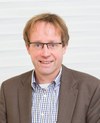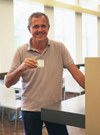Dear FRIAS Community,
The FRIAS Express is back – right in week 1 of U Freiburg’s summer term. The next four months will see a host of fascinating colloquia, workshops, lecture series, dinner speeches and other academic as well as social activities in Albertstrasse 19. Moreover, we are very much looking forward to a fully populated FRIAS building serving as a hotbed of intellectual activity and a communication, interaction and debating space for our current fellows AND the remarkable number of alumni, fellows and guest researchers who are going to join us this spring and summer! This April issue will give you a first taste.
We are also happy to have a new team member on board. Succeeding Katharina Seibel, who has moved on to a permanent position at the prestigious German Academic Scholarship Foundation in Bonn, Sophie Baar has joined us on a two-year trainee position working in press and public relations. Having studied social anthropology and environmental studies in Bremen, Istanbul and Lund, she is looking forward to support the interdisciplinary work at FRIAS and making it public.
 TOP NEWS TOP NEWS
» Heinz Maier-Leibnitz Prize 2017 for Junior Fellow Dr. Evi Zemanek

Congratulations to Evi Zemanek, Junior Professor in Modern German Literature, upon receiving Germany’s most important award for excellent and aspiring early-career researchers. This most distinguished prize is jointly awarded by the Deutsche Forschungsgemeinschaft (DFG) and the Federal Ministry for Education and Research (BMBF).
Only 10 laureates were chosen out of 150 nominees. Particularly noteworthy is that Evi is the only award winner from the humanities this year. Both DFG and BMBF emphasize her pioneering role in the interdisciplinary field of literature studies, cultural ecology and ‘ecocriticism’, especially with her research on poetics of ecotopia and ecological genres. Additionally, she is honoured for her efforts and contributions in establishing the DFG network for early career researchers on ‘Ethics and Aesthetics of Literary Representations of Ecological Transformations’. Until the end of this summer term, Evi will continue her FRIAS fellowship and project on "Caricatures of Man-Made Nature: Reflections on Environmental Change in German Magazines from the Era of Industrialisation".
The award ceremony takes place in Berlin on May 3rd. Press release
» Selection of Fellow generation 2017/18 and project groups
In early February, the Scientific Advisory Board selected 19 external senior fellows, 5 external junior fellows, and 5 internal junior fellows. As usual, all external fellows are Marie Sklodowska Curie Fellows, co-funded by the EU. Moreover, 4 project groups were selected from as widely diverse disciplines as genetics, psychology, finance mathematics, and conflict and migration studies. Most of the selected applicants and all research teams will start working at FRIAS from September/October 2017 onwards. Details on the newly selected fellows and project groups will be made available in a few months from now.
» New fellows at FRIAS

We want to welcome our new junior fellows at FRIAS: Junior Professors Eva von Contzen (English Literature) and Christian Leukel (Sports Science/Human Neurophysiology) as well as Michael Rießler (Linguistics), who started their FRIAS Fellowship in March and April respectively.
At FRIAS, Eva von Contzen will start building her own research group (1 postdoc, 2 PhD students) funded by the ERC Starting Grant she was recently awarded. Over the next few years she will continue her research on the use and functions of lists in in English literary history, a topic which she started working on as an external FRIAS Junior Fellow back in the academic year 2013/14.
Christian Leukel is a junior professor in the field of neurophysiology in sports sciences. In his 10 month-FRIAS project he will investigate neural processes in the corticospinal system of the human brain that are responsible for motor control. Christian is not a complete FRIAS novice; he was a member of the project group “Neural networks of motor control and motor learning” during the academic year 2015/16.
Michael Rießler is a linguist specializing in Finno-Ugric and Scandinavian languages, currently leading his own research group at the University of Freiburg. In his FRIAS project, which is funded by the Finnish Koneen Säätiö (Kone Foundation), he will work on the documentation and description of the rare Uralic language Komi-Zyrian. If you want to learn more about Komi and the research of Michael Rießler, you can watch this short introduction video or check the project’s database.
» FRIAS-USIAS joint group METABEVO publishes results in Nature Communications
Our former fellows Prof. Dr. Ralf Reski (University of Freiburg) and Dr. Danièle Werck-Reichhart (Université de Strasbourg) have published results from their 2013-2015 FRIAS-USIAS Joint Group METABEVO in Nature Communications. With their research on the phenolic metabolism of the moss Physcomitrella patens, Reski and Werck-Reichhardt have identified the enzyme responsible for the growth of the cuticle, the protective layer of a plant. 450 million years ago this protective layer initiated the transfer from aquatic to terrestrial plants. The results of their research have important implications on the bio-technological production of biopolymers.
You can read more about the significance of their findings in the press release. The link to their publication you find here.
» Selection of three new Freiburg-Strasbourg-Joint Groups 2017-2019
Together with USIAS, our partner institute at the University of Strasbourg, FRIAS will fund three new joint research groups. This selection was made out of an impressive number of 25 strong applications, in itself a sign of how lively and high-powered the research collaboration between U Freiburg and U Strasbourg as strategic partners is. (Clearly, more would have deserved it, but funding restrictions forced the selection board to keep the number of selected groups down to three.) These are the teams which are to be congratulated:
- Prof. Dr. Wolfgang Hess (Freiburg), Prof. Dr. Pascale Romby (Strasbourg): MapRNA: Mapping RNA-RNA pairings in vivo in bacteria and their importance in fast acclimation processes
- Prof. Dr. Andreas Walther (Freiburg), Prof. Dr. Nicolas Guiseppone (Strasbourg): Implementation of Light-Powered Nanomachines into Polymer Bulk: From Fundamentals of Active Matter to Functional, Life-Inspired Polymer Materials
- Prof. Dr. Jean Berard (Strasbourg), Prof. Dr. Karl-Theodor Eisele (Strasbourg), Prof. Dr. Thorsten Schmidt (Freiburg), Prof. Dr. Ernst Eberlein (Freiburg): Linking Finance and Insurance: Theory and Applications
All the PIs involved as well as the postdocs will start their collaboration in September/October this year and receive funding for two academic years.
 LOOKING AHEAD LOOKING AHEAD
» Summer term lunch lecture series on 'Fear'
Following last term’s highly successful lunch lecture series on ‘Ignorance’, it is the topic of ‘Fear’ that we will tackle in our bi-weekly Thursday lunch lectures this term, beginning on May 4th. FRIAS fellows and distinguished professors of U Freiburg from disciplines as diverse as economics, film studies, medieval studies, political theory, sociology, wildlife ecology, psychology and psychiatry will reflect on the role of fear, its different appearances, causes, consequences, meanings, and possible treatments, both in the present and the past. This term’s lecture series is to be seen in the wider context of the “Topic of the year 2017” agreed upon by the global consortium of University-Based Institutes for Advanced Studies (UBIAS), consisting of some 40 member institutions worldwide. More about the programme and about UBIAS here.
 PEOPLE AT FRIAS PEOPLE AT FRIAS
In each issue, FRIAS Express introduces people behind the scenes who crucially contribute to the continuous development of the Institute, either as a member of its Steering Committee (central for all questions of governance) or its Scientific Advisory Board (responsible for all major selection decisions concerning fellowships, research foci, and project groups).
This month: Prof. Dr. Ralf von den Hoff, member of the FRIAS Steering Committee
 Prof. Dr. Ralf von den Hoff has been a member of the University of Freiburg since 2006, when he was appointed Professor of classical archaeology. He became an internal Senior Fellow at FRIAS in 2012. During his time at FRIAS, he continued his research in the field of visual history, specifically on the influence of Greek heroes and the development of a political, cultural and social identity in ancient Greece. For his habilitation at the University of Munich, von den Hoff focused on the Greek hero Theseus, who is the polis (city) hero of Athens. As part of his iconographic analysis, von den Hoff studied the discourse around Theseus and its influence on the transition phase of Athens in the 6th and 5th century B.C. This field of research was influential for the creation of the Collaborative Research Center (Sonderforschungsbereich - SFB) 948 "Heroes - Heroizations - Heroisms. Transformations and Conjunctures from Antiquity to the Modern Day" at the University of Freiburg, whose coordinator and speaker Ralf von den Hoff has been since 2012. More about the SFB 948 here. Prof. Dr. Ralf von den Hoff has been a member of the University of Freiburg since 2006, when he was appointed Professor of classical archaeology. He became an internal Senior Fellow at FRIAS in 2012. During his time at FRIAS, he continued his research in the field of visual history, specifically on the influence of Greek heroes and the development of a political, cultural and social identity in ancient Greece. For his habilitation at the University of Munich, von den Hoff focused on the Greek hero Theseus, who is the polis (city) hero of Athens. As part of his iconographic analysis, von den Hoff studied the discourse around Theseus and its influence on the transition phase of Athens in the 6th and 5th century B.C. This field of research was influential for the creation of the Collaborative Research Center (Sonderforschungsbereich - SFB) 948 "Heroes - Heroizations - Heroisms. Transformations and Conjunctures from Antiquity to the Modern Day" at the University of Freiburg, whose coordinator and speaker Ralf von den Hoff has been since 2012. More about the SFB 948 here.
Ralf von den Hoff studied classical archaeology, ancient and early history at the Universities of Bonn and Munich. In 1992 he received his PhD from the University of Bonn, followed by positions at the University of Munich (completion of his habilitation in 2000) and as a visiting assistant professor at the department of classics at Johns Hopkins University, Baltimore
He is currently a member of the ‘Zentraldirektion’ of the German Archaeological Institute (DAI) and the spokesman of the ‘Fachkollegium Alte Kulturen’ of the German Research Foundation (DFG). Beyond an interest in iconology and visual culture in ancient times, von den Hoff’s special field of research is the study of Greek sculptures and antique portraits as media of representation, with a focus on Alexander the Great and the portraits of monarchs. In 2014 he co-published a book on Augustus as the first Roman emperor.
In 2015 Ralf von den Hoff was appointed a member of the FRIAS Steering Committee, and as such has already given invaluable support and guidance to FRIAS in its long term development.
 DIRECTOR'S CORNER DIRECTOR'S CORNER
 Saturday, April 22, has seen Marches for Science in many places of the world, in Freiburg too (with about 2,500 participants). Scholars are at risk (e.g. in Turkey), higher education institutions are at risk (like the Central European University in Hungary), science itself is at risk (just think of creationism and denials of climate change, as increasingly gaining ground in the US, especially in the Trump administration). Small as its contribution may be, FRIAS will not tire in its attempts at doing all that is in its power to make science and top research, and the desperate need for both, intelligible to a wide university public and, especially, to the general public. Our Lunch Lecture series on 'Ignorance' and 'Fear' may serve as just the most recent examples, coupled with our Freiburger Horizonte lectures addressing central societal problems and debates like, for instance, the somewhat incoherent and conflicting asylum and integration policies in Europe today. FRIAS is currently also trying to offer temporary help for scholars at risk. I guess, my general message is that we should never forget that Institutes for Advanced Studies are extremely privileged places, regardless where in the world they are located. In worrying times like these, worrying for science as in many other respects, this becomes even more obvious. Let's take this as an obligation to leave the comfort zone and to work hard not only at the forefront of research, but also at the forefront of all those in academia who are trying to reach out and bridge the gap between science and the media, politics and, above all, society! Saturday, April 22, has seen Marches for Science in many places of the world, in Freiburg too (with about 2,500 participants). Scholars are at risk (e.g. in Turkey), higher education institutions are at risk (like the Central European University in Hungary), science itself is at risk (just think of creationism and denials of climate change, as increasingly gaining ground in the US, especially in the Trump administration). Small as its contribution may be, FRIAS will not tire in its attempts at doing all that is in its power to make science and top research, and the desperate need for both, intelligible to a wide university public and, especially, to the general public. Our Lunch Lecture series on 'Ignorance' and 'Fear' may serve as just the most recent examples, coupled with our Freiburger Horizonte lectures addressing central societal problems and debates like, for instance, the somewhat incoherent and conflicting asylum and integration policies in Europe today. FRIAS is currently also trying to offer temporary help for scholars at risk. I guess, my general message is that we should never forget that Institutes for Advanced Studies are extremely privileged places, regardless where in the world they are located. In worrying times like these, worrying for science as in many other respects, this becomes even more obvious. Let's take this as an obligation to leave the comfort zone and to work hard not only at the forefront of research, but also at the forefront of all those in academia who are trying to reach out and bridge the gap between science and the media, politics and, above all, society!
|



 Prof. Dr. Ralf von den Hoff has been a member of the University of Freiburg since 2006, when he was appointed Professor of classical archaeology. He became an internal Senior Fellow at FRIAS in 2012. During his time at FRIAS, he continued his research in the field of visual history, specifically on the influence of Greek heroes and the development of a political, cultural and social identity in ancient Greece. For his habilitation at the University of Munich, von den Hoff focused on the Greek hero
Prof. Dr. Ralf von den Hoff has been a member of the University of Freiburg since 2006, when he was appointed Professor of classical archaeology. He became an internal Senior Fellow at FRIAS in 2012. During his time at FRIAS, he continued his research in the field of visual history, specifically on the influence of Greek heroes and the development of a political, cultural and social identity in ancient Greece. For his habilitation at the University of Munich, von den Hoff focused on the Greek hero  Saturday, April 22, has seen Marches for Science in many places of the world, in Freiburg too (with about 2,500 participants). Scholars are at risk (e.g. in Turkey), higher education institutions are at risk (like the Central European University in Hungary), science itself is at risk (just think of creationism and denials of climate change, as increasingly gaining ground in the US, especially in the Trump administration). Small as its contribution may be, FRIAS will not tire in its attempts at doing all that is in its power to make science and top research, and the desperate need for both, intelligible to a wide university public and, especially, to the general publ
Saturday, April 22, has seen Marches for Science in many places of the world, in Freiburg too (with about 2,500 participants). Scholars are at risk (e.g. in Turkey), higher education institutions are at risk (like the Central European University in Hungary), science itself is at risk (just think of creationism and denials of climate change, as increasingly gaining ground in the US, especially in the Trump administration). Small as its contribution may be, FRIAS will not tire in its attempts at doing all that is in its power to make science and top research, and the desperate need for both, intelligible to a wide university public and, especially, to the general publ